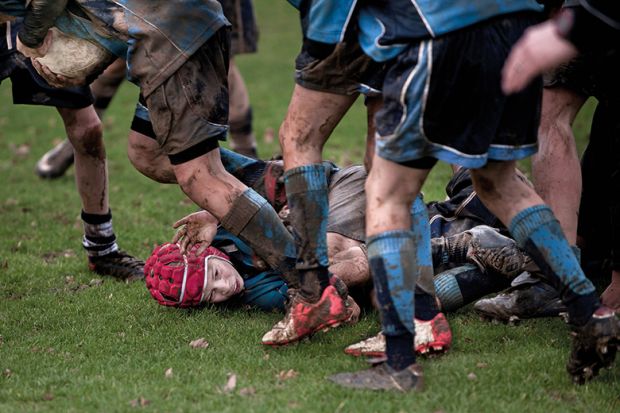Call it tension, or call it a balance: the dual forces of competition and collaboration have always been part of life for both universities and academics.
The need to collaborate is obvious. If research is fundamentally about creating new knowledge, then such parochial concerns as your nationality, or who happens to employ you, are irrelevant.
What matters is working with the colleagues whose combined effort, experience and expertise will deliver the next breakthrough, laying another building block in the edifice of human knowledge.
But the central role of competition is equally evident. Researchers often aren’t collaborating because of a sense of the brotherhood of man. Instead, they are collaborating because doing so will produce better papers, which will help them be competitive (whether or not the rules of the next research excellence framework take some of the sting out of this in the UK is discussed in our opinion pages this week).
Science is a battle to get to the discovery first; to beat competing groups and outshine individual rivals. One symptom of this is the prevalence of dog-eat-dog tactics around authorship, and in our cover story this week academics share war stories from the publication front line.
What’s clear is that some truly shameless chicanery goes on. One early career researcher recalls an edited draft of a paper they had produced coming back from a principal investigator (who had contributed next to nothing) with a single edit: “All we had was a red circle around my boss’ name and an arrow that pointed to the front of the authorship list.”
Similar tales of skulduggery abound, and for Trisha Greenhalgh, a senior scientist at the University of Oxford who has mentored many young researchers, it is the obsession with metrics, and the extent to which they determine career success, that is largely to blame.
“We shouldn’t be eating our young,” she says. “Somehow the moral behaviour of academics is being overshadowed by the performance against metrics.”
This is an uncomfortable assertion in an age when metrics are becoming more, not less, powerful in academia. Universities rightly pride themselves on being citadels in which values, ethics and the pursuit of truth are more important than private-sector concerns such as maximising shareholder value. Yet the alternative currency of academic prestige is not always the purifying force that might be supposed.
Of course, the dual forces of competition and collaboration are not restricted to the lab or the authorship of academic papers. Universities themselves are equally used to being both bitter rivals and supportive friends.
Speaking last week at an event organised by the Higher Education Policy Institute, Sir Michael Barber, chair of the UK’s Office for Students, suggested that the nature of these relationships may be changing, with a need for even greater collaboration in research, but also greater competition in teaching.
Clearly this chimes with the remit of the OfS, which takes over as regulator of UK higher education in January. One of its primary goals is to ensure that fee-paying students get value for money, with competition and market forces providing the impetus.
But it is less clear how the call for greater collaboration is supported by the current trajectory in the country – particularly when we know that it is international collaboration that produces the best research (as evidenced by higher citation among internationally co-authored papers).
Speaking at the same event in London, Lord Willetts, the former universities and science minister, pointed out that conversations had now begun on Framework Programme 9, the next phase of the European Union’s highly successful collaborative funding programme.
For the first time, Willetts noted, the UK did not have a voice in the room at these discussions. What a blow for a country that used to be the first name on the list.
POSTSCRIPT:
Print headline: Competing virtues
Register to continue
Why register?
- Registration is free and only takes a moment
- Once registered, you can read 3 articles a month
- Sign up for our newsletter
Subscribe
Or subscribe for unlimited access to:
- Unlimited access to news, views, insights & reviews
- Digital editions
- Digital access to THE’s university and college rankings analysis
Already registered or a current subscriber? Login







